By Jaime Walker staff reporter For students such as Alonso Sanchez, the time he spends outside the classroom is sometimes just as valuable as the hours he spends in it. But with 28 days left until spring graduation, will all those hours spent on co-curricular activities really help you find a job? Sanchez, a junior mathematics and art history major, said he takes an active role in a variety of organizations because he enjoys the work, not because it builds his résumé. "I have learned some valuable lessons as a student leader," he said. "At the end of the day, it can be really rewarding to look back and see that you did things to make a difference on this campus. I do all of this because I am motivated and love it, not because I want a job later." Sanchez is president of the International Student Association, a member of the International Student Foundation and is a resident assistant in Milton Daniel Hall. If he were hiring a recent college graduate, Provost and Vice Chancellor for Academic Affairs William Koehler said he would consider academic record more seriously than a leadership record. "Classroom performance is a good indication of intelligence," he said. "Strong academics show that a student has the motivation and commitment to do what it takes to get a task done." Ryan Shultz, office manager for Ackerman McQueen Advertising Agency, said academics are important, but so is personality.
Penny Woodcock, program coordinator for the TCU Leadership Center, said co-curricular activities are designed to reinforce the theories students learn in the classroom. "Leadership opportunities offer students a chance to test what they learn in a real-world setting," she said. "By being involved, either on- or off-campus, students really develop the communication skills that employers really want." Carolyn Ulrickson, director of TCU Career Services, said the employers who come to the center seeking TCU students look for well-rounded individuals. "Students need to understand that balance is the key to success," she said. "In the classroom, students learn about historical perspectives and theories, but if they cannot communicate that knowledge, what is the point of having it?" Koehler said students should take the time to get involved in campus activities but need to make sure they are spending enough time on academics. "There are a lot of options on this campus," he said. "It can be easy to get caught up in everything else and forget that your primary purpose on this campus is to succeed at the academic rigors of this institution." Ulrickson said maintaining a strong GPA is important, but employers want to hire strong communicators who possess a variety of skills. "When you are applying for your first job, GPA can be a good indicator of performance, but after that, no one cares," she said. Carol Thompson, chairwoman of the sociology and criminal justice department, said once students get to college, they set their own priorities. "Each student makes an individual choice about how to spend his (or her) time," she said. "No matter what decisions they make, there are consequences. If they get overloaded with activities, classes may suffer. The trick is to remember more is not always better." Walker Moody, a junior Spanish and psychology major, said he has gained valuable experience not only as the current president of the Interfraternity Council, but also in his other leadership roles. "Through these experiences, I have learned to communicate effectively, manage projects in a group setting, motivate others and take responsibility in all areas of an organization," he said. Sanchez said he would not survive his schedule if he did not plan in advance. "Sometimes I don't even know how I get it all done, but I plan out my month and then stay flexible," he said. Woodcock said co-curricular activities offer students a variety of ways to explore their strengths and weaknesses before actually entering the working world. "When students chose to have activities complement their academic performance, employers take notice," she said. When students join organizations just to add a line on their résumés, employers will know, Moody said. "In an interview, an employer will ask you to explain what you have on your résumé," he said. "They know as well as we do that it's not about the title on the business card. It's about what you learn in those positions."
Jaime Walker
By Courtney Roach staff reporter Most students were watching the news, huddling in a stuffy hallway with fellow students or outside trying to get a glimpse of the tornado Tuesday night. However, a few got more than a glimpse. Josh Hill, a junior marketing major, decided to venture downtown with his roommate Drew Durrett, a senior engineering major, right after the storm and found more than he bargained for. "We were driving down Texas Street downtown, which isn't really in the center of downtown, and we could see a clear path where the tornado had been," Hill said. "On one side of the street, a building would be fine, and on the other side, it would be torn up. It was weird. You could see where the tornado turned and moved. "While we were driving, a boy was standing on the side of the street next to a damaged building (on West Seventh Street), and he was waving his hands frantically trying to get us to pull over." Hill said they stopped and got out, and the boy told them someone was trapped under bricks in the building. "We could hear a voice coming from under a big pile of bricks outside of the building," he said. "When we started pulling bricks off to get to the voice, we realized the person had been underneath an awning and the front of the building had collapsed on the person." Hill said he and Durrett could tell the person was homeless because there was a lot of cardboard and someone's belongings underneath the bricks. "As we took more and more bricks off, we could tell there were two people, not just one," he said. "We first helped the one that was making the noises. He had to put his arms around me so I could drag him out. He had cuts all over his head, and his arm was all mangled and looked like it was broken." Hill said they then went back and found the other guy laying under the rubble and dragged him out. "The guy wasn't moving, so I felt for his pulse, and I thought that he had one," he said. By then Hill said a fire truck had arrived, and firefighters began checking the man for a pulse. He said the first firefighter thought he also found a pulse. However another firefighter did not after checking more than once. "That's when we realized he was dead," he said. Hill said reporters arrived after that and were trying to take pictures of the body. He said the firefighters asked him if he had a blanket to cover the man, and he gave them a leather mat that was in the back of his truck. "The guy who lived told me that the other man's name was Carl Spence and that he had been his traveling buddy," he said. Hill said he and Durrett returned home after that and did not go any further into downtown. "I just don't want to be spotlighted for this because it wasn't a good thing that happened," Hill said. Another TCU student, Erin Munger, a junior advertising/public relations major, got caught in the path of the tornado on her way to work at the Reata restaurant in the Banc One tower, 500 Throckmorton St. "I was on my way to the Reata to take pictures of the storm because at that point I didn't know there was a possible tornado coming," Munger said. "I was on Camp Bowie Boulevard, and I looked up and saw a cloud starting to turn overhead. I didn't turn around because there were too many cars, so I went ahead and sped to the Reata and parked in the parking garage." Munger said she was not worried about her car. However, she made sure to grab her purse and camera and ran onto the glass walkway bridge that connects to the Banc One tower. "Hail and debris started coming through the glass roof of the bridge as I was running across," she said. "I was extremely scared because my boyfriend and my roommate were working at the Reata, and I didn't know if they were out yet." Munger said she found her manager on the first floor of the building, and he told her the people who were in the restaurant were now in the stairwell on their way down from the restaurant's location on the 35th floor. She said she saw debris swirling outside of the building and witnessed pieces of furniture being ripped through glass windows. "I found my boyfriend in the parking garage, and I took some pictures there, some outside, and then we snuck back up to the Reata to take some there," Munger said. She said the storm was over by then, and she went back outside and saw window blinds falling to the ground everywhere. Munger said she took pictures mostly of the Banc One tower because of all the windows that were blown out. "It was so amazing because nature is that powerful. We were all just awestruck," she said. "That was one of the most amazing things I've ever seen in my life."
Courtney Roach
By Reagan Duplisea staff reporter In the office of the new vice chancellor for finance and business, the bookshelves are half-full, and the walls are bare, except for a couple of framed pictures. Carol Campbell, TCU's vice chancellor of finance and business, said she has spent all her time and energy focusing on the budget since beginning work on March 13. She will present the budget to the Board of Trustees on Friday. "I landed here at crunch time in the budget process," Campbell said. "I'm trying to very quickly come up to speed." Kay Westendorf, Campbell's assistant, said Campbell settled in right away. "Because of the timing and because we're so busy with board work and budget work, it's been business as usual," Westendorf said. Former Interim Chief Financial Officer Ron Clinkscale has been instrumental in helping her catch up, Campbell said. "He said, 'If you need me, just whistle,'" she said. "We whistled on (March 15). He's very generous with his time and knowledge." Chancellor Michael Ferrari said the administration was looking for someone to fill the vacancy quickly. The position was vacated when James McGowan left last summer. "When we started the search process, we wanted someone to start as soon as possible," Ferrari said. "Her institution just finished completing its budget cycle." Campbell previously served as vice president of Carleton College in Northfield, Minn. She said one of the reasons she took the job was the size of TCU. She has worked at Carleton, a small, private liberal arts college, and the University of Minnesota, a large public university. "TCU has the best of both," Campbell said. "It's the size of the institution I think I'll enjoy." Campbell said there were many other reasons she chose to come to TCU. "As I started talking to people at TCU, I started finding the enthusiasm and excitement that is being generated," she said. "It's an exciting place to be and an exciting time to be here." Her responsibilities as vice president at Carleton included overseeing human resources, physical plant and food service, but Campbell will focus mainly on finance at TCU. One of her main responsibilities will be to look into PeopleSoft, Campbell said. "Now that we've gone through the conversion to PeopleSoft, part of my responsibilities will be looking at the budget process and procedure and do some refining," she said. She said her three main goals for the office will be to continue to increase the endowment, work on management and continue to build on financial systems. She said she would like to refine the systems and provide better information to the rest of the university. Campbell said the only person she knew from TCU before coming to apply for the position was Leo Munson, associate vice chancellor for academic support. They served together on the board of Tuition Plan Consortium, a group that is working on a venture where prepaid tuition certificates could be honored at colleges across the United States. "Ours has been a business relationship," Munson said. "She's a very articulate, deep thinker. "Carol's not one of those people that talks ad nauseam on any subject that comes up. She has very good listening skills. But when she speaks, people listen because what she has to say is to the point and in-depth." One of the highlights of her career, Campbell said, was testifying before a Congressional subcommittee on pension simplification. "It's a type of immortality to be in the Congressional Record," she said. Campbell is involved in several national organizations, such as the National Association of College and University Business Officers. She also was involved in civic activities in Northfield, such as serving as a trustee of Northfield City Hospital and Skilled Nursing Facility and as the director of the Rotary Club of Northfield. Although she has not had time yet, she said she would like to become an active citizen in the Fort Worth community as well. Campbell said she manages to balance both work and outside activities, but it is not easy. "It is helpful that my children are grown, and my husband is very understanding," Campbell said. "I have a tendency to overcommit. My husband calls it a genetic defect. I can't say no." Campbell's husband is a retired high-school teacher. They have five sons, one daughter and seven grandchildren. She said in what little spare time she has, she enjoys fishing and gardening. "When we packed the car to come down here, it was a tight fit, but I did manage to find room for some plants," she said. She also likes to travel and has recently made a couple of trips to the British Isles. "I want to see as much as I can see before I die," Campbell said. "But I'm feeling very good about where I am and what I'm doing. I'm at a point that I've achieved goals that I've set out earlier."
Reagan Duplisea
Editor's note: This is the eighth in a series of articles profiling the 17 task forces that make up the Commission on the Future of TCU. By Jeff Anderson staff reporter The Alumni task force is trying to find out what events and programs future graduates and current alumni are interested in, said Kristi Hoban, director of alumni relations. John Breyer, professor of geology and task force member, said it is important to find ways for TCU to be actively involved with its graduates. "(The task force) was encouraged from the start of the project to think outside of the box," Breyer said. "We used to group (alumni) by year, but special interest groups will be more focused than just graduation year." Hoban, a task force member, said the task force discovered that not all alumni are interested in the same programs. At the January meeting, the members of the task force brainstormed to decide what special interest groups are important to alumni, she said. Special interest groups could include certain departments, fraternities, sororities, band or other organizations. Ronald Flowers, professor of religion and task force member, said it is natural for alumni to think of relationships with TCU through their groups or departments. "The concept of special interest groups is a valid one," Flowers said. Hoban said members of the task force wanted to know what alumni and current students were thinking about special interest groups. An MBA marketing group is surveying current alumni, involved and uninvolved with TCU, to see if they are interested in special interest groups, she said. An undergraduate business marketing group is surveying current students to find out what they know about the TCU Alumni Association and what they expect when they graduate, Hoban said. Chuck Lamb, professor of marketing and task force member, said the purpose of the surveys is to determine if current and future alumni are not likely to participate in the same university alumni events. "Some alumni are interested in athletics," Lamb said. "Some alumni are interested in music." Hoban said alumni are interested in different areas depending on what stage in life they are in. Alumni who have children may want to include their children in the events, she said. Hoban said at the next meeting, April 17, both marketing groups will present the results of their surveys. Steve Grafton, a guest speaker from the University of Michigan, will speak to task force members, she said. Grafton, director of alumni relations, will discuss how the alumni association program is working for Michigan, Hoban said. Final task force recommendations are due June 1. The alumni task force is one of 17 on the Commission on the Future of TCU, which was established by Chancellor Michael Ferrari to determine how the university can "move to the next level of academic distinction."
Jeff Anderson
By Chris Gibson staff reporter
Well, I was one of those people too. Until Tuesday night. That was the night my apartment on First Street in downtown Fort Worth gave me a front row seat to the tornado that made its way through the area. As daylight broke, and I was able to see the devastation, I came to realize just how lucky my roommate and I really were. Tuesday afternoon started like any other weekday. I was lying on the couch watching television and following thunderstorm reports on the news. That was about the time my roommate came rushing into the house, grabbed my truck keys and ran back out without saying a word. Later, I found out he was being a good roommate and moving my truck under covered parking - saving it from the damage that was to come. He is not a weatherman, and he did not even predict that "American Beauty" would win the Oscar for Best Picture. He works, however, on the 20th floor of the Bank One tower, high enough to see the beginnings of a major storm. What happened next was something I hope never happens to me again. We both rushed outside, not knowing the twister was less than five city blocks away. Our electricity was out, and we had no way of knowing the danger we were in. What we saw as we looked to the west, past the historic Tarrant County Courthouse and the Fort Worth Jail, was an eerie green sky with what looked to be a large dirt cloud in the middle. As the trash and debris swirled around us, we looked at each other almost with awe. In unison, we blurted out, "That's a tornado."
I rushed back outside, just in time to realize the natural weather phenomenon we had identified before was now headed straight for us. I cannot say what the tornado did next because my roommate and I came to our senses and rushed into the house. I could feel my heart beating faster as I tried to figure out the best place to hide from the storm I was sure would hit any minute. Now I have seen "The Wizard of Oz" a few times, but I never thought that I would be so close to meeting those little munchkins as I was at that moment. The storm blew over us, apparently weakened by the downtown buildings, and left my apartment untouched. We went outside to see what the storm had done to our city. What we saw was something I will never forget.
My roommate talked me into venturing into downtown to see firsthand what the tornado had done. We decided to drive four blocks into Sundance Square and take the camera. What I saw reminded me not of the bright lights and welcoming sounds that have come to define downtown to me but scenes from the Oklahoma City bombing. Buildings were mangled. Broken glass glittered from the now numerous police and emergency lights. People were inspecting the damage, some to their own property, others to their favorite downtown spot. Just off of Fifth Street, a husband and wife, traveling from New Zealand, had to figure out how they were going to get home after their car was destroyed. Still others jokingly asked, "So does this mean the bars are closed?" Later that night, everyone would realize this was no joking matter. Four people have now been confirmed dead, and many others injured. In a city and at a school full of people who say, "This could never happen to me," trust me. It can.
Chris Gibson
By Jaime Walker staff reporter
Since the F-2 twister struck the downtown area at approximately 6:45 p.m., Barr has been working with hundreds of emergency personnel and government officials to help the city pick up the pieces. "It is hard for some people to believe this happened here, but, obviously, it does," he said. "As far as tornadoes go, the city has been very lucky, but I guess our luck ran out." Barr, who spent the day surveying the damage, said the disaster could have been much worse. "If the tornado had struck an hour earlier or a mile north or south of where it did, we would have had a much bigger disaster on our hands."
"It is a true blessing that more lives were not lost," he said. Barr spent the afternoon on the phone to government officials from around the state and the nation. Mayors from across the country have called to offer support, he said. Texas Gov. George W. Bush called Barr from the presidential campaign trail in New Jersey with a pledge to do whatever it takes to rebuild areas of Tarrant County destroyed by the storm. According to the Associated Press, Bush has declared Tarrant County a state disaster area. Barr said emergency service personnel have played a vital role in cushioning the blow of the tornado's effects. "We need to recognize that an enormous number of people have been working around the clock to keep our citizens informed and safe," he said. "We owe them a huge debt of gratitude for doing their job so well."
"Glass is falling from the Bank One Building in huge sheets for about a 300-foot radius," he said. "Until we can clear the area of glass, the blocks around it will be cordoned off." Barr said he expects Fort Worth and its citizens to handle the disaster well. "It will take months and months for us to recover fully from this, but I am confident that we will get through it."
Jaime Walker |
| The TCU Daily Skiff © 1998, 1999 Credits |
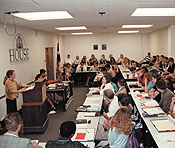 "You can have all the credentials in the world,"
she said. "But, if you have no people skills, you will never get a
job."
"You can have all the credentials in the world,"
she said. "But, if you have no people skills, you will never get a
job."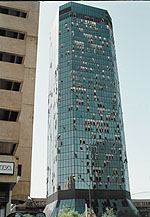 When a big disaster happens, you often read or see people
on the news saying, "I just thought that something like this would
never happen to me."
When a big disaster happens, you often read or see people
on the news saying, "I just thought that something like this would
never happen to me."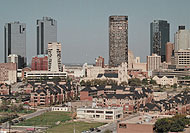 Now, I don't know if it was the journalist or the "guy"
in me that made me grab my camera from the upstairs bedroom, but either
way, it made for some footage that I will never forget. As I fumbled around
in the darkness of an unlit apartment, the tornado was eating its way through
the middle of downtown, tearing 450-pound double-paned glass windows from
skyscrapers and ripping trees out of the ground by their roots.
Now, I don't know if it was the journalist or the "guy"
in me that made me grab my camera from the upstairs bedroom, but either
way, it made for some footage that I will never forget. As I fumbled around
in the darkness of an unlit apartment, the tornado was eating its way through
the middle of downtown, tearing 450-pound double-paned glass windows from
skyscrapers and ripping trees out of the ground by their roots. 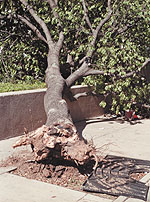 Trash, wood and pieces of metal were tossed
all over the place like clothes in a teen-ager's room. Looking west into
the horizon, I could see and hear the effects of the tornado: Sirens were
blaring, and fire alarms could be seen flashing in buildings now mostly
without outer windows, all amidst a puzzling calm sky. I knew we had just
witnessed something serious.
Trash, wood and pieces of metal were tossed
all over the place like clothes in a teen-ager's room. Looking west into
the horizon, I could see and hear the effects of the tornado: Sirens were
blaring, and fire alarms could be seen flashing in buildings now mostly
without outer windows, all amidst a puzzling calm sky. I knew we had just
witnessed something serious. 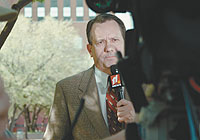 Fort Worth Mayor Kenneth Barr got about
as much sleep Tuesday night as some of the tornado victims.
Fort Worth Mayor Kenneth Barr got about
as much sleep Tuesday night as some of the tornado victims.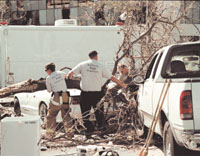 Although current damage costs are estimated at $157 million,
Barr said buildings can be reconstructed.
Although current damage costs are estimated at $157 million,
Barr said buildings can be reconstructed.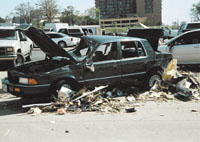 Barr said areas like the Montgomery Ward
district and the Bank One Building will take a long time to rebuild, but
officials are working quickly to make those districts safe.
Barr said areas like the Montgomery Ward
district and the Bank One Building will take a long time to rebuild, but
officials are working quickly to make those districts safe.